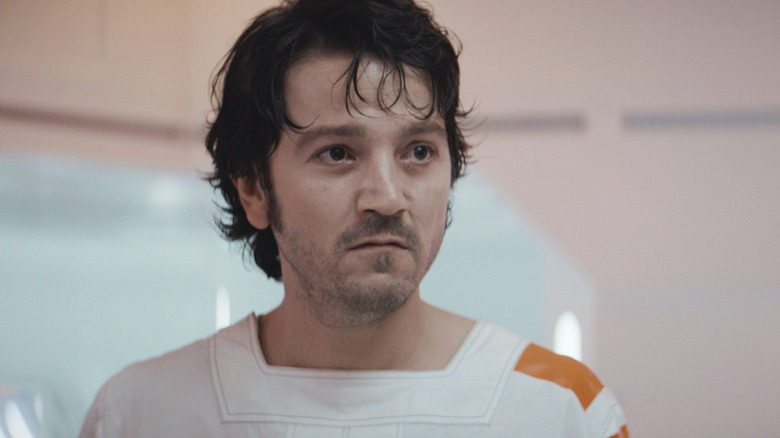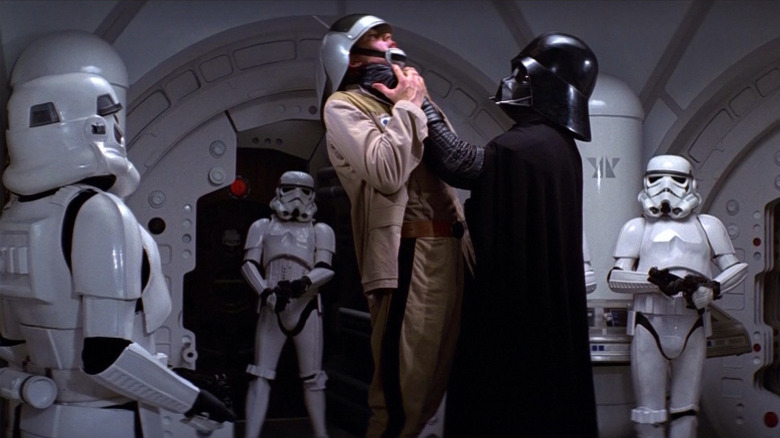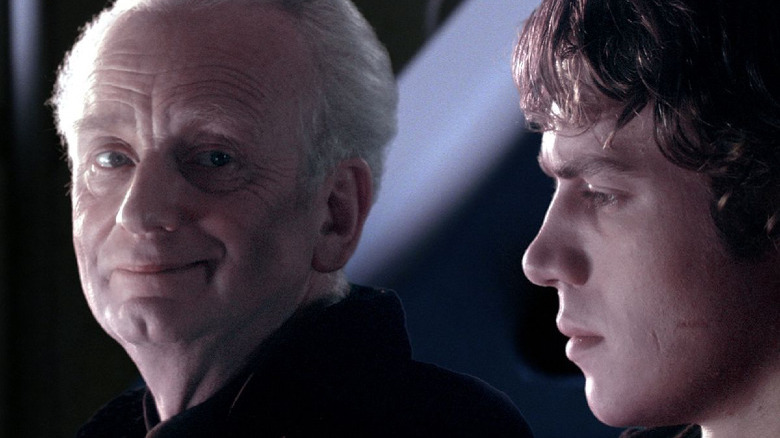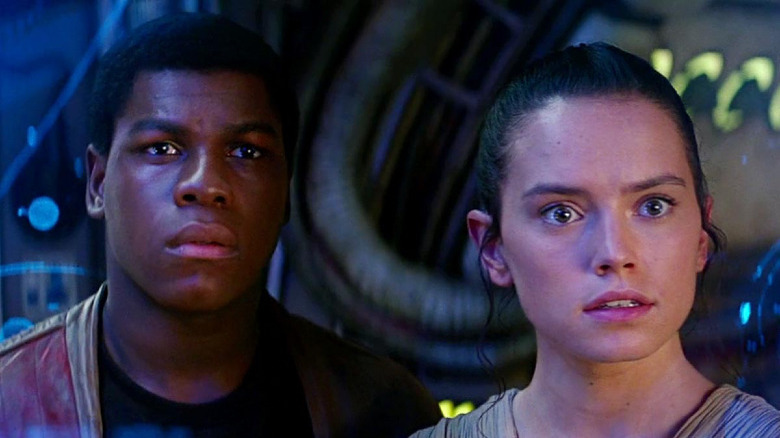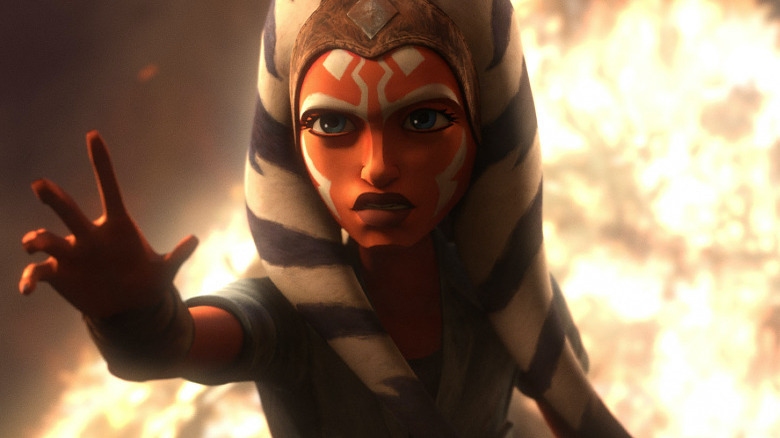Star Wars Is A Mirror For The World, And It's Best When It Remembers That
George Lucas has a thing for the past. Nearly every movie he's ever directed and/or written takes place in a period setting or, in the case of his most famous creation, "a long time ago." Even the big exception to this trend, his 1971 feature directing debut "THX 1138," is a film about everyday civilians rebelling against an oppressive system and the tyrannical overseers that uphold it, like so much of the rest of his work.
If one were to ask the man behind "Star Wars" why that is, his answer would be straight and to the point, if not exactly comforting. "No matter who you look at in history, the story is always the same," Lucas told the Chicago Tribune in 2005. "That's what's eerie. It was a little eerie that things have developed the way they have." It's why previous attempts to make fellow sci-fi juggernaut "Star Trek" into an action franchise like "Star Wars" have wielded, to put it kindly, wildly mixed results. "Star Trek" is about a utopian future worth aspiring to. "Star Wars" is a mirror for the world we live in and a way for us to take a good, hard look at who we are at any given moment in time.
In a lot of ways, this idea clashes with the general public's perception of "Star Wars" as a crowd-pleasing, escapist spectacle more concerned with technical achievements than daring storytelling. Indeed, when "A New Hope" arrived in 1977, it seemed to exist in direct contrast to the cynical, disenchanted mindset that had dominated so much of American cinema in the '70s. That is, assuming you believed the film's Rebel Alliance was a surrogate for the U.S. as so many American moviegoers did.
Are we the baddies?
George Lucas has never denied that "Star Wars" was meant to be read as a criticism of U.S. imperialism. "It was really about the Vietnam War, and that was the period where [Richard] Nixon was trying to run for a [second] term, which got me to thinking historically about how do democracies get turned into dictatorships?" he told the Chicago Tribune. "Because the democracies aren't overthrown; they're given away."
You can see how audiences might have missed that when watching "A New Hope" in 1977. The film takes heavy inspiration from historical imagery of Nazi Germany for the look of the Galactic Empire, whereas the shots of Rebel pilots in the climactic Death Star trench run are a clear homage to Michael Anderson's 1955 WWII epic "The Dam Busters." (The two movies even share the same director of photography, Gilbert Taylor.) By associating the Rebels with the Allied forces, Lucas inadvertently made "Star Wars" more commercially viable while at the same time muddling the film's political subtext.
As the original trilogy stretched on, however, it became harder to misconstrue Lucas' meaning. "The Empire Strikes Back" depicts the Rebels as being vastly outmanned and outgunned by the Empire, to the degree that they seemed doomed to lose the greater war. In a 2004 audio commentary for the home market re-release of "Return of the Jedi" (via History), Lucas similarly affirmed that the forest-dwelling Ewoks of Endor were modeled after the Việt Cộng fighters who battled the U.S. during the Vietnam War.
"The irony of that one is, in both of those, the little guys won. The big, highly technical empire — the English Empire, the American Empire — lost. That was the whole point," said Lucas, speaking on the 2018 mini-series "James Cameron's Story of Science Fiction."
So this is how liberty dies
In the years between the original and prequel trilogies, "Star Wars" lived on via the now-defunct Expanded Universe (aka Star Wars Legends). The remnants of the Empire reorganized and built super-weapons capable of destroying entire star systems. Somehow Palpatine returned by cloning himself. A new Republic was formed and Luke Skywalker established a Jedi Academy, only for his nephew to fall to the dark side. Sound familiar? Yes, many elements from the EU were later repurposed for the Disney canon, while others were (graciously) abandoned.
Leading up to the prequel trilogy, the overarching story of the EU paralleled life in the real world. With the Cold War over, the U.S. no longer had a clearly defined "enemy" — although that didn't stop us from frantically searching for a new one, as satirized in comedies like 1995's "Canadian Bacon" — and was left to look inward. This was our chance to really correct the failings and problems that had long plagued our own society, and we began to do just that ... sort of. But as America's democratic process stagnated, fascism began to creep back into fashion toward the end of the 20th century.
George Lucas was certainly clued into this as he began working on his prequel trilogy, though even he didn't realize just how on the nose his films would end up being with their political subtext. "First of all we never thought of [George W.] Bush ever becoming president, or then 9/11, the Patriot Act, [the wars in Afghanistan and Iraq], weapons of mass destruction," producer Rick McCallum told the Chicago Tribune in 2005. Lucas concurred, claiming that he actually wrote Padmé Amidala's infamous line from "Revenge of the Sith" ("So this is how liberty dies: with thunderous applause") prior to all that.
Let the past die... or not
Say what you will about the "Star Wars" prequels (or maybe don't, otherwise we'll be here all day), but their depiction of the Empire's ascent and Anakin Skywalker's fall to the dark side have only grown more prescient with time. To quote Emily St. James' 2019 Vox piece, "The 'Star Wars' prequels are bad — and insightful about American politics":
For as stilted and affectless as the films can be, they're tapped into something raw and real about how often seemingly stable societies collapse into fascism, into revolution, into political upheaval.
"Star Wars" would once again stumble into political relevancy after Disney bought Lucasfilm in 2012. The first movie to release under the Mouse House, "The Force Awakens," undeniably rehashes much of the plot of "A New Hope." (Cue the requisite "It's like poetry, they rhyme" joke.) Yet, shortly after its arrival, it became unsettlingly apparent just how timely the film truly was — telling a story about a new generation of tyrants emulating those that came before them, only more extreme, and a young band of marginalized heroes forced to fight the same battles their predecessors had supposedly "won" long ago.
The next two films, "Rogue One" and "The Last Jedi," further emphasized the ways civilians can bring about larger social reform and the importance of learning from history, not repeating its mistakes or dwelling on past failures. Even "Solo," despite its tired origin story, highlighted the ways inequality and injustice thrive under fascism. And yet, before the divisive response to "The Last Jedi" caused a panicked Disney to try and steer the franchise away from topical issues (resulting in the nothingburger that is "Rise of Skywalker"), many of these movies would resort to nostalgic fan-service at the expense of their intrepid, substantial storytelling.
A new rebellion begins
With the rise of its Disney+ streaming series, the live-action side of "Star Wars" has seen both dips and peaks in its creative output. When it's at its best, "The Mandalorian" is sympathetic to the plight of those having to scrap by in the modern gig economy (be those gigs strictly legal or not) while the market rebuilds itself — a story that has only grown more topical post-2020. "Obi-Wan Kenobi" similarly finds its footing when it zeroes in on the titular Jedi's struggles to find a way forward after having the only life he ever knew taken away from him (a feeling we here in the real world can all relate to). As for "The Book of Boba Fett," well, there are worthwhile themes buried beneath its jumbled shared universe storytelling.
With "Andor," however, "Star Wars" has finally fulfilled the promise of films like "Rogue One" and "The Last Jedi," embracing a more adult tone, a boots-on-the-ground visual aesthetic, and boldly political commentary. It's also served to help the live-action side of the franchise catch up with the world of "Star Wars" animation. Shows like "Clone Wars" and "Star Wars Rebels" have already explored complex spiritual and moral themes that many of the live-action films have yet to broach (and in a kid-friendly context, no less), while the "Tales of the Jedi" miniseries only took things further on that front in 2022. Even the second season of "The Bad Batch" is off to a promising start; as /Film's Bryan Young noted, it's doubled-down on the "anti-fascist sentiment," making it "a thematic counterpart to 'Andor.'"
Can the franchise keep it up? I certainly hope so. "Star Wars" is always better off speaking to the issues of the day. It would do well to remember that.
